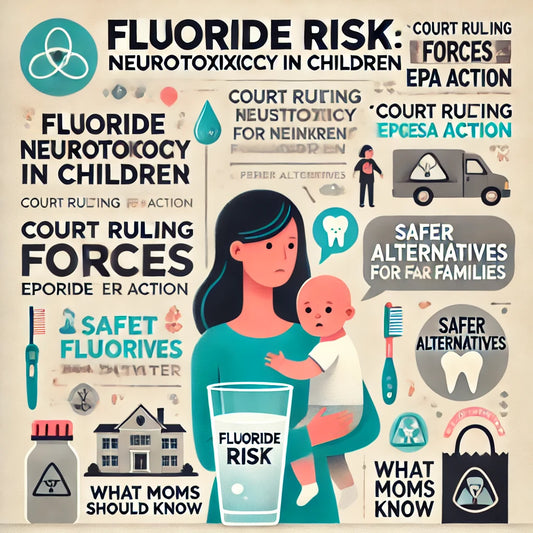
Fluoride in Drinking Water: What Parents Need to Know About Recent Changes and Health Impacts
Share
The Story of Fluoride in Public Health
Fluoride was first added to water in the 1930s, after researchers noticed fewer cavities in areas with naturally fluoridated water. Since then, fluoride has been seen as an essential part of dental health, particularly in communities with limited access to dental care. But with new studies from countries like Canada and Mexico, researchers are beginning to re-evaluate fluoride’s role, especially its impact on children’s brain development.
New Research: What Are the Risks?
Recent studies have introduced concerns about fluoride’s neurotoxicity, particularly for children. Findings suggest that children exposed to high levels of fluoride may experience lower IQ scores and attention issues, with formula-fed babies who consume fluoridated water at higher risk. The 2024 federal court ruling, which challenged the CDC’s recommendation of 0.7 mg/L of fluoride in water, cited fluoride as an “unreasonable risk” to children’s health, a bold statement that has led to a reconsideration of fluoride’s role in public health.
Steps Parents Can Take
Mom Bomb encourages parents not to feel overwhelmed but to take small steps to reduce fluoride exposure for their families. For instance:
- Use Fluoride-Filtering Water Filters: Not all water filters remove fluoride, but options like reverse osmosis are effective.
- Consider Fluoride-Free Toothpaste for Younger Kids: Fluoride-free toothpaste is especially recommended for toddlers who haven’t yet learned to spit, reducing the risk of dental fluorosis.
- Stay Updated on Guidelines: The EPA is actively reviewing fluoride guidelines, meaning updated recommendations may be coming soon.
Fluoride Beyond Water
Fluoride isn’t only in drinking water. It can also be found in some foods and medications, which means that keeping fluoride levels in check involves more than just monitoring water intake. As science continues to evolve, it’s crucial for parents to stay informed and to have open conversations with healthcare providers about fluoride and other environmental factors that could affect their family’s health.
Conclusion
The recent court ruling on fluoride has highlighted the importance of staying informed as scientific understanding evolves. While fluoride has long been hailed as a public health success, new research suggests that moderation and careful consideration are key. By staying informed and consulting with trusted sources, parents can make the best choices for their families.
Call to Action
Listen to the Mom Bomb Podcast for more deep dives into the science that affects our families, and stay empowered to make informed health decisions.



